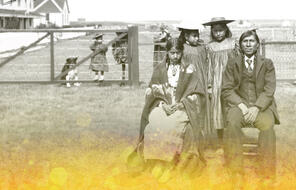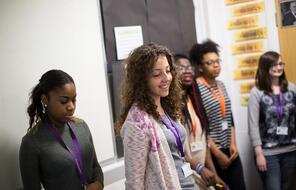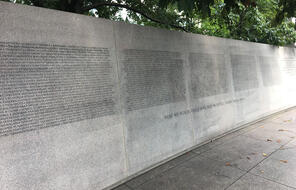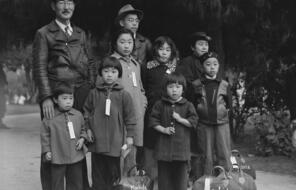Language Loss
The government and school administrators stressed the importance of enforcing the use of English (and sometimes French, and at times even Latin for Mass and other religious rituals), as they recognized the strong link between language and culture. The ban on Indigenous languages created tremendous confusion and tensions among the students. Many of the students did not speak any English when they entered the schools, and they could not possibly understand what was expected of them. For others, speaking the native tongue was a form of resistance—a way to hide from the school staff their true emotions and thoughts. But the schools usually responded to the use of native languages forcefully.
Bestselling author and commentator on Indian Residential Schools Theodore Fontaine went to Fort Alexander Residential School in Manitoba and spoke only Ojibway as a child. Here is how he describes his experience at the school:
Once when we were all in the playroom, I was playing on the floor with several friends, reliving a picture show we’d seen at movie night and using small objects like stones and pieces of wood to act as the cowboys. I was startled when Sister S., the supervisor that day, almost knocked me on my back as she wrapped her powerful, bony arm around mine. I’d inadvertently said something in Ojibway. She’d assumed I was referring to her when a couple of the boys laughed at my comment. She yelled that she’d wash out my mouth with soap but instead dragged me to where she’d been sitting. I was shoved into a closet behind her chair. It was under the stairs leading to the second floor and it was used to store brooms and other cleaning materials.
I don’t remember how long I was in there, but it seemed like an eternity. I was desperate. I tried to sit up but banged my head on the overhead stairs. I tried to see the light under the door. Hearing the sounds of play outside the closet at least made me feel closer to my classmates. I clenched my eyes to visualize my cousin Dee and me frolicking at Treaty Point. I stretched my legs—which rattled a pail in the closet and then upset it. Sister S. hissed at me to be quiet. At least her crackly voice reassured me that someone was nearby. I sobbed for a while, to no avail. Eventually she let me out. Her first word was “Tiens! (Take that!)” followed by a warning not to speak my “savage” language.
. . .
As a young boy I spoke only Ojibway. I did know certain things in English from hearing them said by others. . . . My education in English was long and tedious, and the lessons sometimes very surprising. Spending time on our reserve and hearing Ojibway had allowed the priests and others in authority to learn some of our language and sometimes understand the gist of our conversations. The nuns in particular would listen intently when we whispered and talked in Ojibway. They’d pretend not to hear or understand us so as to catch us saying something they didn’t like. I thought then that this was one of the reasons we couldn’t speak our language. I later learned that they thought it was a language of savages and not created by God. 1
Other punishments to prevent the children from speaking their native languages included forced isolation, withholding of meals, and washing the child’s mouth with soap. In extreme cases, teachers gave students electrical shocks or pushed needles into their tongues to associate the speaking of their mother tongue with excruciating pain. 2
Connection Questions
- Why do you think the use of English and French was so heavily enforced in school and the use of Indigenous languages resulted in punishment? What effects, both short- and long-term, do you think the enforcement of European languages had on the students?
- How important is your language to your identity? In what ways does language tie together places, people, and traditions that are the centre of one’s identity?
- What is lost for individuals and a culture when a language is no longer spoken?
How to Cite This Reading
Facing History & Ourselves, "Language Loss," last updated October 16, 2019.















